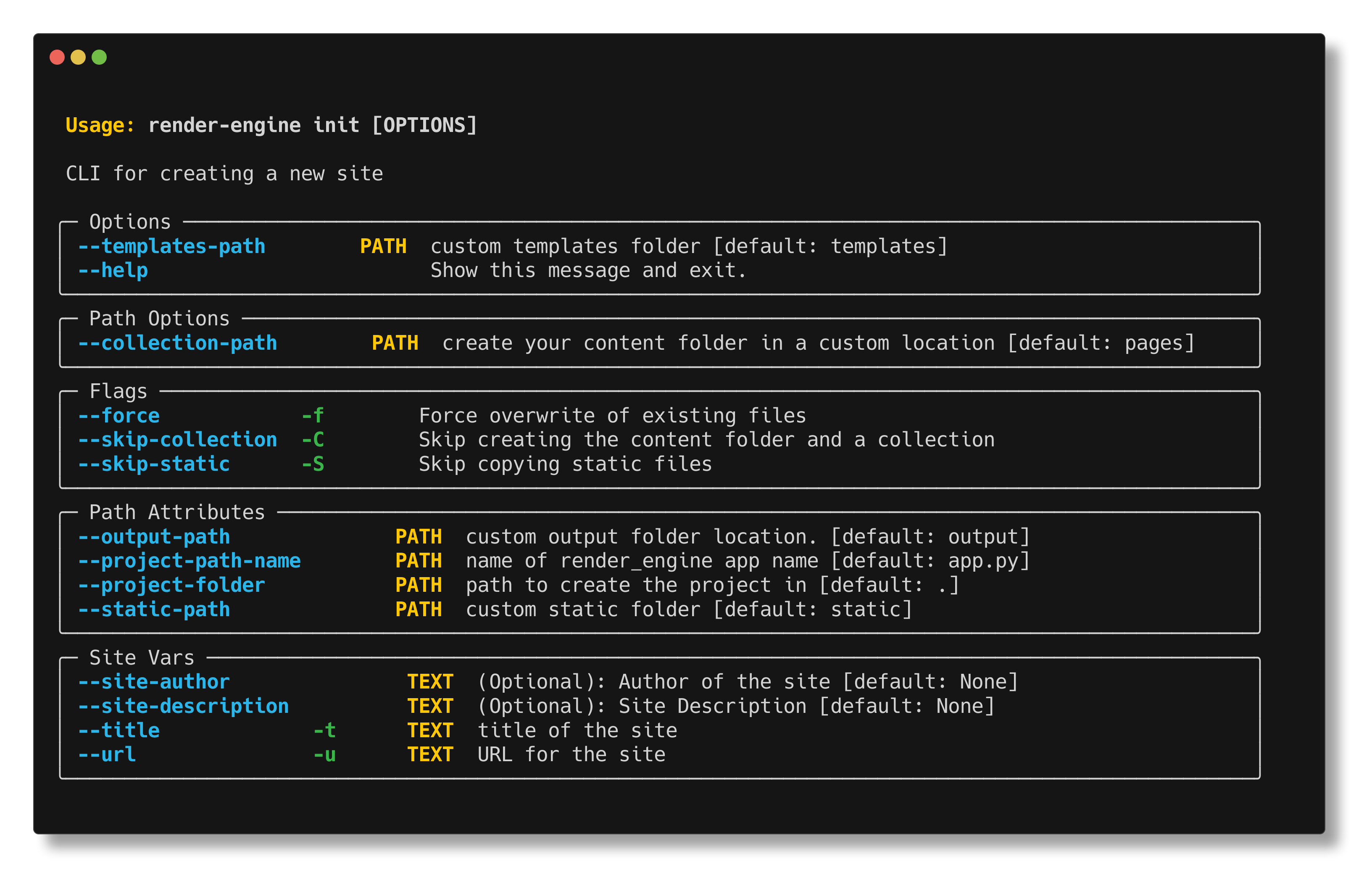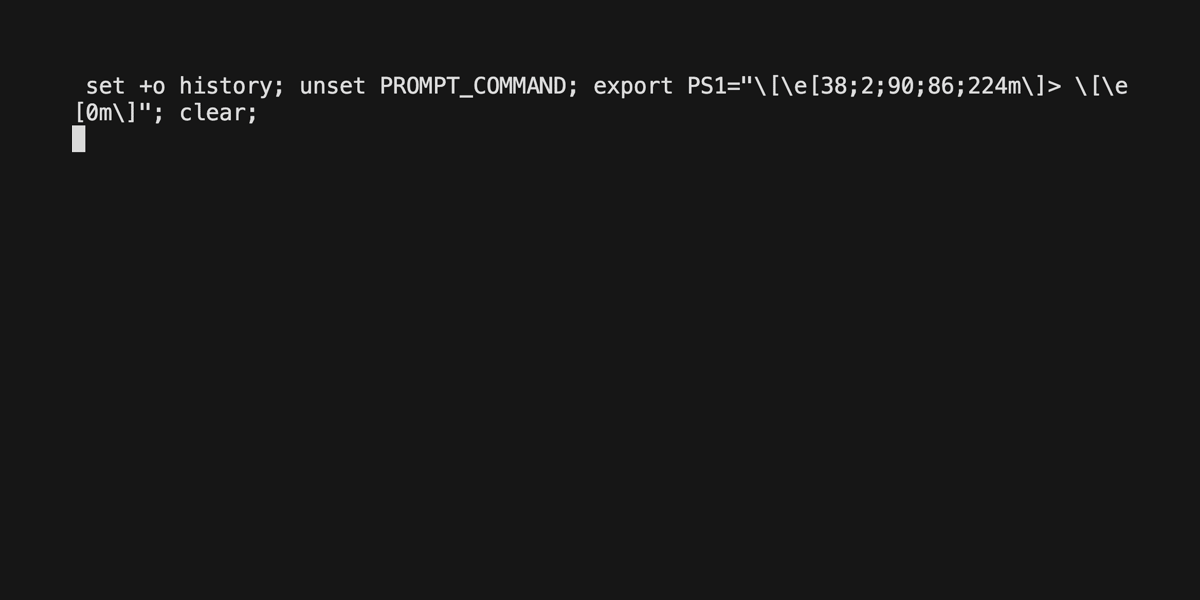
Render Engine 2023.1.2 brings CLI, Parsers, and Begins Extensions Work and More
Source: https://render-engine.readthedocs.io/en/latest/ 🔗
Render Engine, my long term static site generator project, has been updated to version 2023.1.2. This was the biggest update I've made and also begins creating a more structured update cycle.
I talked about some of the development process and reasoning in a recent Developer Journal update.
https://www.youtube.com/watch/8WYK_9Nk2i8
There are many updates (sorry I'm not that great at managing my changelog), but here are a few of the big topics.
Return of the Route List and {{url_for}}
A few years ago, Render Engine had a route-list that held all the pages prior to being generated. Due to issues with performance, route_list was removed and instead pages were generated in-place.
With recent versions of Python stressing performance, I've brought back the route_list to allow for pages to be able to reference one another.
{{url_for}} creates the ability to reference a page in your content or jinja template .
---
slug: hello
---
My url is hello.html
# in index.html
<div>
Say <a href={{url_for 'hello'}}>Hello</a>
</div>
This will allow for internal site references to help prevent breaking links from being created.
[BREAKING] Changes to how pages/collections are rendered
A minor yet breaking change is the commands that render the pages and collections. The rendering for the pages has completely changed internally which called for a rewrite of the rendering methods as well.
Instead of render_page and render_collection now sites use page for single page entries and collection for collection-based entries.
The removal of render_ was to highlight how pages were created. Rendering a page or collection now happens in site.render. This was done to consolidate all of the building into a function to make it easier to make changes in the future.
from render_engine import Site, Page
site = Site()
@site.page
class Index(Page):
pass
[BREAKING] More Structure and Removal of site_vars in Page Objects
site_vars were originally setup to give you access to site variables in jinja templates. This responsibility has been moved to Jinja which means page objects no longer store site_vars in every page.
Collection Variables now in collection_vars
There were times where Collection information overwrote Page information. To avoid this, acollection_vars property create a similar structure to site_vars. That said, attributes in collection_vars are passed in as CONSTANTS in the Page object
---
title: custom page
attr: Attribute 1
---
...
from render_engine import Collection
class MyCollection:
attr1 = "Attribute 2"
content_path = "path/to/custom/page"
page = MyCollection().pages[0]
page.attr1
>>> "Attribute 1"
page.COLLECTION_ATTR1
>>> "Attribute 2"
[Breaking] Custom Parsers and Collections
This is perhaps the biggest change for Render Engine.
Since the beginning, Render Engine primarily used Markdown (Markdown 2 to be specific). That said I've used many hacks to build pages from custom datatypes. This update does two things:
- Removes all parsing out of the Render Engine components.
- Parsing is done using Parsers
PageParsers
PageParsers are a new component Page objects use to generate HTML.
The default parser, BasePageParser, defines the frontmatter attribute component for all content. This means that unless explicitly overwritten you can use frontmatter to define attributes.
A MarkdownPageParser has been included with render engine and is accessed in render_engine.parsers.markdown.
from render_engine import Page, Collection
from render_engine.parsers.markdown import MarkdownPageParser
class MyPage(Page):
Parser=MarkdownPageParser
class MyCollection(Collection):
PageParser=MarkdownPageParser # sets the parser for all pages
Custom Collections
Along with PageParsers, Custom Collections now exist. This has always been supported, but now we're working to provide structure for Parser/Collection Extensions.
A few of these already exist and can be found in the discussions section of the repo.
CLI
You can now setup and build your Render Engine site using the cli command render-engine.
Create a new site with render-engine init. You can also pass several commands to create the base template quickly.

You can build your site with render-engine build. This is akin to using @site.render in your actual render-engine build file.

I've been thinking a lot about what to expose in the CLI. Expect a few more commands in the future.
What's Next
Extensions?
I've been working to support validators and other types of extensions. I hope to have a roadmap soon and this will be on it.
More Tests and Docs
We had to rewrite our tests and docs so that many of our changes were tested. That said there are many edge-cases that haven't been covered.
Also our docs definitely need more love. I hope to add that as well.
Better Automated Infrastructure around Content
While this blog post was fun, I struggled to remember all of the things that were added in this post. I also have some looming fear that I may have missed something.
I plan to add better version control, a proper changelog, and more (necessary) CI/CD.
A friendly reminder that Render Engine is an open source project and contributions are welcome.
I hope you check out Render Engine. This update brings a lot and some of the updates were only because of the amazing conversations I've had with a few folks that are using it, supporting it through GitHub Sponsors.